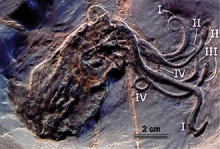Octopodiformes is a superorder of the subclass Coleoidea, comprising the octopuses and the vampire squid. All living members of Octopodiformes have eight arms, either lacking the two tentacles of squid (as is the case in octopuses) or modifying the tentacles into thin filaments (as in vampire squid). Octopodiformes is often considered the crown group of octopuses and vampire squids, including all descendants of their common ancestor. Some authors use the term Vampyropoda for the same general category, though others use "Vampyropoda" to refer to the total group (all cephalopods closer to octopods than to true squid). Another term is Octobranchia, referring to cephalopods without prominent tentacles.[4]
| Octopodiformes Temporal range: The oldest fossils of stem-group octopods appeared in the Serpukhovian (late Mississippian) | |
|---|---|
 | |
| Fossil of Proteroctopus from the Middle Jurassic of France, now thought to be a basal vampyropode or vampyromorph | |
| Scientific classification | |
| Domain: | Eukaryota |
| Kingdom: | Animalia |
| Phylum: | Mollusca |
| Class: | Cephalopoda |
| Clade: | Vampyropoda |
| Superorder: | Octopodiformes Fuchs, Von Boletzky, & Tischlinger, 2010[2] |
| Subgroups | |
| Synonyms | |
It is considered one of the two extant groups of the Neocoleoidea.[2]
Pohlsepia, originally described as earliest octopod is considered as dubious for this group in later study.[1][4] Syllipsimopodi, a squid-like cephalopod from the Mississippian-age Bear Gulch Lagerstätte of Montana, was originally described as the oldest unambiguous vampyropod.[4] However, further analyses might be necessary to unequivocally assign this cephalopod to Vampyropoda.[5][6]
Syllipsimopodi has a combination of squid-like features (like 10 arms) and octopod-like features (like biserial suckers and a simplified internal shell).[4]
Classification
- Class Cephalopoda
- Subclass Nautiloidea: nautilus
- Subclass †Ammonoidea: ammonites
- Subclass Coleoidea
- Superorder Decapodiformes: squid, cuttlefish
- Clade Vampyropoda
- Genus †Syllipsimopodi[4]
- Genus †Proteroctopus
- Superorder Octopodiformes / Octobranchia
- Family †Trachyteuthididae (incertae sedis)
- Order Vampyromorphida: vampire squid
- Clade: Muensterelloidea
- Family: †Muensterellidae
- Family: †Patelloctopodidae
- Order Octopoda
- Genus †Keuppia (incertae sedis)
- Genus †Palaeoctopus (incertae sedis)
- Genus †Paleocirroteuthis (incertae sedis)
- Genus †Proteroctopus (incertae sedis)
- Genus †Styletoctopus (incertae sedis)
- Suborder Cirrina: finned deep-sea octopus
- Family Opisthoteuthidae: umbrella octopus
- Family Cirroteuthidae
- Family Stauroteuthidae
- Suborder Incirrina
- Superfamily Octopodoidea[7]
- Family Amphitretidae[8]
- subfamily Amphitretinae: telescope octopus
- subfamily Bolitaeninae: gelatinous octopus
- subfamily Vitreledonellinae
- Family Bathypolypodidae
- Family Eledonidae
- Family Enteroctopodidae
- Family Megaleledonidae
- Family Bolitaenidae: gelatinous octopus
- Family Octopodidae: benthic octopus
- Family Amphitretidae[8]
- Superfamily Argonautoidea
- Family Alloposidae: seven-arm octopus
- Family Argonautidae: argonauts
- Family Ocythoidae: tuberculate pelagic octopus
- Family Tremoctopodidae: blanket octopus
- Superfamily Octopodoidea[7]
References
External links
Wikiwand in your browser!
Seamless Wikipedia browsing. On steroids.
Every time you click a link to Wikipedia, Wiktionary or Wikiquote in your browser's search results, it will show the modern Wikiwand interface.
Wikiwand extension is a five stars, simple, with minimum permission required to keep your browsing private, safe and transparent.
